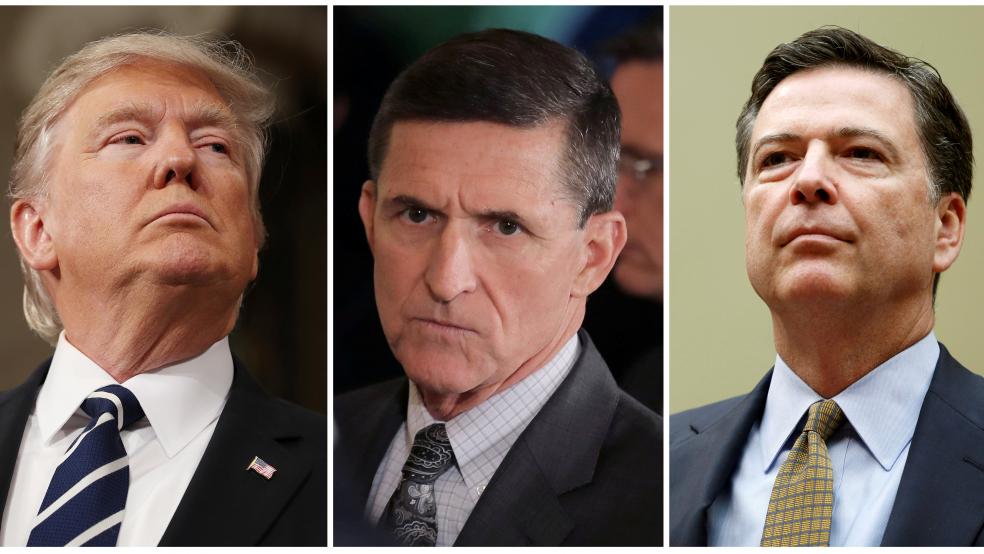The Trump administration’s efforts to keep Russian interference in last year’s election out of the headlines are being overwhelmed by events, as another week ostensibly dedicated to a different issue threatens to be overtaken by more news and revelations about Kremlin-backed efforts to damage Democratic nominee Hillary Clinton and to compromise the integrity of the voting process.
On Tuesday morning, the beginning of the second day of what the administration is calling “Workforce Development Week,” Bloomberg News published a major story revealing that Russian efforts to penetrate state and local level computer systems related to the November elections was far wider than had previously been reported. The attacks were detected in at least 39 states and included attempts to erase or change voter registration data and access campaign finance records.
Related: RNC Chair Calls For End to Trump Probe As Lines Harden Over Comey’s Testimony
The blockbuster story comes on the same day that Attorney General Jeff Sessions is expected to sit down for hastily scheduled testimony before the Senate Intelligence Committee in which he will face probing questions about Russia, and just hours after Senate negotiators came to terms on a package of sanctions meant to punish Russia for various acts, including election meddling.
The upshot is that, like last week’s effort to direct attention to domestic development projects by declaring “Infrastructure Week,” this week’s theme will also be overshadowed by questions about Russia and the investigation into whether or not people involved with the Trump campaign colluded with the Kremlin-backed hackers.
The Bloomberg story reveals that the sheer number of attempts to compromise computer systems of state and local election offices in the months before the vote provoked an outraged response from the Obama administration, delivered to the Kremlin through a secret back-channel communications system established to reduce the chances of accidental nuclear war.
Also on Tuesday, Sessions will appear in what is now expected to be a public Senate Intelligence Committee hearing, just days after his erstwhile subordinate, former FBI director James Comey, told the same panel that he believes President Trump directed him to back off of an investigation into former National Security Adviser Michael Flynn’s connections to the Kremlin.
Related: How the Comey Hearing Made America Great Again
Sessions, a key figure in Trump’s campaign, admitted only after being confirmed as Attorney General that he had private meetings with Russian Ambassador Sergey Kislyak during Trump’s presidential run. Because of that, he agreed to recuse himself from involvement in the FBI investigation of Russian involvement in the election.
However, last month, Sessions signed a memo to the president urging him to fire Comey. The memo attacked the FBI director’s judgment and leadership, but Trump would later explicitly tell NBC News that he had fired Comey because of the Russia investigation. This has raised questions about Sessions’ involvement in the matter, given that he had supposedly recused himself.
During his testimony, Comey also vaguely hinted at the existence of classified information that further cast doubt on the propriety of Sessions’ involvement in anything to do with the investigation into Russian election meddling. Comey is believed to have elaborated in closed session, and reports have circulated that there may have been another undisclosed meeting between Sessions and Kislyak, but what Comey told the committee behind closed doors is still unclear.
On top of all this, the Senate on Monday night agreed on a package of legislation outlining new and tougher sanctions on Russia connected not only to election meddling but to its invasion of Ukraine’s Crimean peninsula and its ongoing support of rebels in that country’s eastern provinces.
Related: Why Trump Is Almost Certainly Bluffing When It Comes to Comey
The sanctions, which are attached as an amendment to a separate bill imposing sanctions on Iran, would go after entities and individuals connected to Russia’s intelligence services, key sectors of the Russian economy, and Russian propaganda outlets that operate in the US.
In a sign that mistrust of the Trump administration’s disposition toward Russia is growing, even among Congressional Republicans, the bill that will come to the floor later this week includes provisions meant to prevent the President from taking unilateral action to lift the penalties imposed on Russia. Under the bill, any effort to provide sanctions relief would be subject to congressional review.





